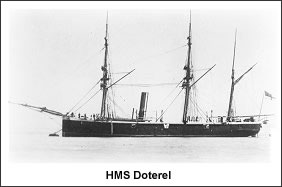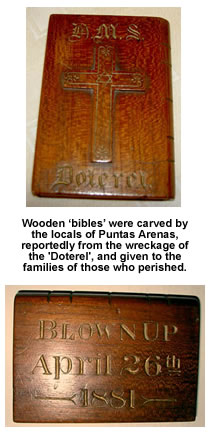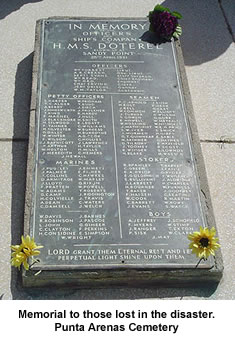Like many other novices to family history, I had assumed that any ancestors killed in HM Forces would have been involved in a conflict. I was proved wrong when I started investigating my 2x great-uncle.
WILLIAM HENRY BARRETT was born on 25th September 1854 in Millbrook, Cornwall, the eldest son and the second of the five children born to William and Mary Ann Barrett. William Henry’s elder sister, Amelia Jane, was my great-grandmother.

Millbrook is just across the Tamar from Plymouth, which is a well-known seafaring city containing the dockyard at Devonport. William Henry had followed in the footsteps of many other family members and joined the Royal Navy, and I located him on board ‘HMS Invincible’ on the 1881 census. The ‘Invincible’ was moored in the Grand Harbour in Valetta, Malta, at that time.
After the 1881 census, I could find no trace of William Henry anywhere. I trawled many years of deaths in the UK and abroad to no avail, so I decided to obtain his Royal Naval service record.
When it arrived, it was pitifully brief. Aged 19, William Henry had signed up for an initial 10 years service in 1874.

He served on the ‘Indus’, ‘Swiftsure’, ‘Invincible’ and, finally, the ‘Doterel’, and his service was marked as exemplary. Alongside the details of his service on ‘HMS Doterel’, in the column headed “If discharged, whither and what for”, was written “DD, ship blown up”.
I then set out to find out as much as possible about this tragedy, and came across an excellent and informative website set up by a Briton living in Southern Patagonia (The British in Southern Patagonia / Los Británicos en la Patagonia Austral). The site owner and I corresponded and he even very kindly sent to me copies of some items that had not been included on the website. I was able to send him a copy of a newspaper report which I managed to ‘win’ on the internet auction site, eBay.
‘HMS Doterel’ was built in 1880 in Chatham and set sail from Sheerness in January 1881, en route to the British Pacific fleet, under the command of Commander Richard Evans, with a crew of 155 onboard. Having been on the ‘Invincible’ in early April, one can only assume that William Henry was transferred to the ‘Doterel’ later that month. Barely an hour after arriving at Punta Arenas (Sandy Point, the Chilean Penal Settlement) in the Strait of Magellan at around 10am on 26 April 1881, a terrible explosion occurred on the ‘Doterel’ which claimed 143 lives, including that of William Henry Barrett. The vessel sank in minutes.
It was first thought that the accident may have been caused by a torpedo previously dropped in the water by ‘HMS Shah’, but it was reported that this torpedo had been safely recovered. Another opinion was that a boiler had exploded, but again, a report discounted this possibility in view of the fact that steam would not have been up due to the ship being at anchor, and a boiler could not have exploded without the effects being clearly distinguishable at 10am.
A court martial was held in September 1881 onboard the ‘Adelaide’ at Devonport dockyard; nominally appointed to try Commander Evans, the real function of the court was to take evidence and pronounce an opinion as to the cause of the explosions.

The court was of the opinion that the destruction was caused by two distinct explosions – the first being an explosion of gas evolved from the coal stowed in the bunkers, and the second, an explosion of the powder stowed in the fore magazine. There was no evidence to suggest which of the two explosions occurred first, or what was the cause of the ignition of the gas. The commander was acquitted of all blame.
‘The Engineer’ newspaper, dated 9 September 1881, gives a detailed report of the court martial, and it was an original of this newspaper which I successfully bid for on eBay. It is now framed and hangs in my little study with other significant bits and pieces of family history. There is also a document detailing the court martial and investigation into the ‘HMS Doterel’ incident held at the National Archives, and I hope to visit Kew soon to view this original document.
The men who lost their lives on the ‘Doterel’ have been very sympathetically remembered. There is a memorial plaque in the Old Royal Naval College Chapel at Greenwich, as well as one in Punta Arenas Cemetery.
There were also wooden ‘bibles’ carved by the locals of Puntas Arenas, reportedly from the wreckage of the ‘Doterel’, and given to the families of those who perished.
Mandy in Wiltshire
© Mandy in Wiltshire 2008